- Home
- Steven Ehrman
The Spanish Butler (A Sherlock Holmes Uncovered Tale Book 8) Page 4
The Spanish Butler (A Sherlock Holmes Uncovered Tale Book 8) Read online
Page 4
“I am not with Scotland Yard, but I have been called in by Inspector Hopkins to aid in the discovery of the culprit in your father and mother’s death.”
The young man seemed at a loss for words for a moment before he finally blurted out: “Berta Bloomfield was my stepmother, sir. My mother died years ago.”
“Of course. My apologies,” said Holmes. “Have you been to the house on Park Lane today?”
“Yes. The Inspector came by this morning and asked me to come over to make an identification of the bodies. He said they prefer a family member make the final identification.”
“Yes, that is the general order of the authorities. I hope it was not too traumatic for you.”
“It is not a business I would wish on my fellow man, but I understood the need. What followed was worse.”
“How so?” asked Holmes.
“Why, the fellow practically accused me of killing them both! It is an outrageous and preposterous idea. I loved my father and I had no bad feelings for my stepmother.”
“Did you present an alibi to the Inspector?”
“Who has an alibi for the middle of the night? I was home asleep. I have been very worried about my wife’s health and I was by her bedside all that evening.”
“Is your wife ill?” I asked. “May I be of any assistance?”
“Thank you, Doctor, but she has been seen by a physician.”
“What ails the lady, if I may ask?” I inquired.
“She became violently sick late yesterday afternoon. She has been confined to her bed since then. She seems to be regaining her strength somewhat.”
“I wish to interview her,” said Holmes. “You have my promise that I will not cause her further suffering.”
“I must refuse that request, sir,” said Edward Bloomfield firmly. “The Inspector made a similar request and I told him just as I have told you. Florence can know nothing of this rotten business. After all, she was sick and confined the entire night.”
“I understand that perfectly, I assure you,” said Holmes. “But she was the last person outside of the staff to see your stepmother. I understand that you were refused entrance.”
“Yes, that is true,” said the young man, with a puzzled expression. “I still do not fully understand why that came to pass.”
“Was no reason given?”
“My father’s secretary simply told me that I was not to be admitted to the house under any circumstances.”
“Come now,” chided Holmes, “you were aware that your father opposed your recent marriage.”
“I know he was surprised and he expressed some concern in our letters, but I had no idea of the vehemence of his objection before he arrived in London.”
“How did you know that he arrived in London?”
“He sent a telegraph from New York informing me of his departure. I ask you, Mr. Holmes, why would he do that if he did not want to see me when he arrived?”
“Did you save the telegram?”
“No, it did not seem important at the time.”
“I see. Well, it was of little matter, in any event. After you were turned away, how did it come to pass that your wife called upon your father and stepmother?”
“It was her own idea.”
“She had no correspondence with your stepmother, for instance?”
“None that she mentioned. She is a very headstrong woman and I believe she felt she could put matters to right.”
“What did your wife and stepmother speak of?”
“Florence says that my stepmother felt that Father would come around in time. She was very hopeful a reconciliation could be made soon.”
“Nothing more?”
“Nothing that I know of,” replied Edward.
“I see,” said Holmes. He stood with his arms crossed over his chest for a moment. “Mr. Bloomfield, I must ask an impolitic question. Who inherits your father’s wealth?”
“Why, I do, of course,” said Bloomfield, “but I see no reason I should tell you. It is a private family matter.”
“Murder makes private matters public rather quickly, Mr. Bloomfield.”
“Father showed me the will before he left for America. I cannot believe that he has changed it. See Father’s solicitors if you will, but I’ll not say a word about it.”
Holmes saw the man’s set jaw and decided to abandon that line of questioning.
“Have you any relations outside of your aunt and uncle?”
“None. The Bloomfields did not multiply as the book of faith tells us,” said the young man wryly.
“But you and your wife will want to start a family, I am sure.”
“Of course. We want nothing more.”
“Well, I believe that is all we need for today,” said Holmes. “Mr. Bloomfield, I am certain we will speak again. Come, Watson.”
CHAPTER SIX
I was surprised at Holmes’s abrupt ending of the interview. It seemed to me that much ground was left unexplored. I said so to my friend and was rewarded with a shrug of the shoulders. This time Holmes did give the Baker Street address to the driver and we soon found ourselves back at our humble diggings.
Afternoon had begun to fade into evening and I was looking forward to supper when our page-boy admitted a weary-looking Inspector Hopkins. Holmes greeted him and steered him into an armchair. Hopkins declined the offer of a cigarette and lit a pipe instead. We all smoked in silence for some minutes. Holmes finally set his own pipe aside and spoke.
“Well, what news do you have for us? I deduce from your manner that the mystery is yet unsolved.”
“It is true, Mr. Holmes, that the mystery remains unsolved,” conceded Hopkins, “but I have let no grass grow beneath my feet.”
“What have you discovered, Inspector?” I asked.
“I have had a look at the passenger list from the ship that the Bloomfields arrived on. One of the Bloomfields fellow passengers was a Frenchman named Rousseau.”
“The jewel thief?” asked Holmes.
“How did you know that, Mr. Holmes,” asked a clearly astonished Inspector Hopkins.
“I would be a poor detective indeed, Hopkins, were I to be unaware of one of the more dangerous criminals on the Continent.”
“Well, I for one have never heard of this fellow,” said I. “He is a criminal obviously, but why has he not been arrested if everyone knows of this?”
“Everyone does not know, Doctor,” said Holmes blandly.
“That’s just it, Mr. Holmes,” said Hopkins. “This man presents himself as a French noble, and for all I know he has distant ties to the nobility, and that is how he manages to get close to his wealthy victims. He had been in America for some time, but I believe that the country became too hot for him.”
“Is there any proof that the Bloomfields and this man socialized on the voyage?”
“Not as of yet, but I have a report that they both dined together at the captain’s table,” said the Inspector. “However, logic would tell us that he at least knew of them, and the lady was not shy about showing off her ring.”
“Still Rousseau is not known to be a man of violence,” said Holmes. “His modus operandi is one of stealth and cunning.”
“True, sir, but a man cornered may do things out of his usual nature,” replied Hopkins.
“Inspector,” said I, “is it possible that there is a connection between this Rousseau fellow and the butler Martinez? They are both foreigners.”
“Rousseau is known to use confederates, so it is possible,” replied Hopkins.
“Is Rousseau still in London?” asked Holmes.
“He is, sir. He is staying at the Langham Hotel. I am having the hotel watched. I intend to keep track of his movements.”
“It is perhaps a bit late for that, but it cannot be helped now,” said Holmes. “Unless you have an objection, Hopkins, I should like to see this man tomorrow.”
“So you do think he might be involved,” said the Inspector.
“I cannot be
certain. Of course, a man such as Rousseau is by nature an observant person. I should like to hear his impression of the Bloomfields, if nothing else. Berta Bloomfield most especially intrigues me.”
“For what reason, Holmes?” asked I.
Instead of answering, Holmes posed a query of his own to Hopkins.
“What of the captain of the ship, Hopkins? I should hope you have included him in your inquires.”
“What has the captain of the steamer to do with this?” asked the Inspector in a perplexed tone. “The crime happened days later.”
“Hopkins, you must learn to look deeper than the surface. The captain of a ship invites guests to his table. If the captain invited both Rousseau and the Bloomfields to dine with him, it could have been to facilitate a meeting.”
“Do you suppose that Rousseau and the captain,” at this point Hopkins consulted his notebook, “ah, his name is Keeler. You are suggesting that the two are confederates.”
“The captain of a transatlantic steamer comes into contact with many wealthy people. It has been my observation that people believe themselves to be safe on a ship when they might not actually be so.”
“But there was no robbery on the ship,” Hopkins protested.
“Nevertheless, this Captain Keeler should be questioned,” said Holmes. “Surely it will not be difficult to track him through the ship owners.”
“Of course, Mr. Holmes. I will see to it immediately. Anything else?”
“Nothing at present, but keep me apprised of anything new. Watson and I will call upon Rousseau in the morning and we shall see what we shall see.”
Holmes was as good as his word and the next morning found us sharing a cup of tea with M. Rousseau in the dining room of the Langham Hotel.
M. Rousseau was a short, slender man with a large, bristling mustache. He had very alert and intelligent eyes and gave somewhat the appearance of a watchful ferret. He had a pleasant smile on his face as he set down his cup of tea.
“This is indeed a pleasure, gentlemen,” he said. “The name of Holmes is of course known to me, though I must say that I never thought to be sitting across from you. To what do I owe the pleasure of this meeting?”
The man spoke excellent English with only the barest trace of a French accent.
“It is in regard to the murder of Arthur and Berta Bloomfield,” Holmes said.
“I am afraid you have me at a disadvantage,” said the man. “I am not familiar with the couple.”
“Dear me,” said Holmes. “Captain Keeler told me that you chatted with them several times on your recent crossing of the Atlantic.”
I never cease to be amazed at Holmes’s capacity for duplicity when it suits his ends. However, the lie certainly had its desired result, as M. Rousseau immediately backtracked on his previous denial.
“Wait. Let me recollect my thoughts. Ah, yes. I remember now. They were an American couple, no?”
Rousseau’s accent suddenly became much more pronounced.
“The lady was an American, but the gentleman was English,” said Holmes with a slight smile.
“One meets so many people when traveling and, alas, as age creeps up, my memory, she becomes overtaxed. I recall them now. You say that they have been murdered? What a shame. What could be the reason behind such a thing?”
“Robbery appears to be the most likely motive,” said Holmes. “Mrs. Bloomfield had a very expensive diamond ring that is now missing.”
“Would someone kill for such a trinket?”
“It was no trinket, M. Rousseau,” replied Holmes. “It was worth many thousands of pounds; and yes, there are certainly people who would kill for such a sum. But surely you saw the ring. Mrs. Bloomfield was said to be very proud of it.”
“I vaguely remember the lady speaking of her jewelry, but it was only in passing.”
“Of course some ladies are known to have copies made of their expensive jewelry,” mused Holmes. “Wouldn’t it be interesting if it was found that the ring had had already been stolen before the couple was murdered?”
“Interesting? I hardly think that would describe it, monsieur.”
“I am only thinking if someone took the trouble to steal the ring and found it to be a counterfeit, they might feel a murderous rage, but I am only speaking in the abstract.”
“It is all supposition though,” said Rousseau. “May I ask, are you questioning all the passengers on the ship?”
“Just those that I felt might have pertinent information,” said Holmes. “You actually met the Bloomfields and you are said to be a man with a sharp eye.”
“You flatter me, monsieur.”
“Not at all. For instance did you see the Bloomfields depart the ship in London? It was Albert Dock, was it not?”
“I do not recall seeing the couple when I departed the ship,” he said. “What was the name of the dock? Yes, I believe you are correct, monsieur. It was the Albert Dock.”
Holmes began to rise and I did as well.
“I will not intrude further upon your hospitality, I know you are a busy man.” Rousseau gave a depreciative hand gesture. “I do have one more question. Did you have a trunk on board the ship?”
“Who does not travel with a trunk, monsieur?” Rousseau responded in a suave tone.
“Who indeed?” murmured Holmes.
We took our leave of the Frenchman and found ourselves on the sidewalk. Holmes indicated that he had private business to attend to. We parted company, with Holmes hailing a cab. I watched my friend depart and decided, as I had no pressing business, to take a walk through the streets of London.
I took no note of where I was going and let my thoughts wander. The murder of the Bloomfields was, of course, utmost in my mind. I went over the facts of the case dozens of times and felt myself no closer to solving the foul crime than when I had begun. I wondered if Holmes had a definite path in mind towards the truth. Holmes was difficult to read under the best of circumstances and normally gave little hint of his thinking until the denouement.
I came out of my brown study and realized that I was quite close the Bloomfield house. Out of curiosity, I decided to go by the place. In a matter of minutes I was within view of the home. As I neared the address, I saw a man exit the home. The man was a tall, slender fellow with a great red beard. To my shock I realized it was Holmes’s caller Seoc Mcnab. I called out to him in my surprise. He looked in my direction and began to walk rapidly away from me.
I was determined to catch up with the man and demand that he tell me what business he had at the site of the murders. As soon as the man realized I was following him, he increased his speed until he was at a full run. I was surprised at the agility and stamina of Mcnab, as I was only gradually decreasing the distance between us.
The man darted across Park Lane and into Hyde Park. I followed. I nearly collided with a young couple and momentarily lost sight of Mcnab. After a moment of confusion, I saw him dash behind a hedgerow some distance away. By the time I reached the same point he had disappeared.
I was angry at not catching the man, but I was determined to discover what mischief he had been into. With that in mind, I retraced my steps to the Bloomfield residence. Once there, I knocked at the door. The maid, Jane Burton, promptly answered it.
“Why, Dr. Watson, please come in,” she said pleasantly.
We walked to the sitting room. I was a bit surprised to see her still employed in the house and told her so. She explained that Mr. Nelson had been instructed by the Bloomfield’s solicitors to keep the staff to look after the home at least until the will was read. Apparently the solicitors thought that the heirs might want to move into the home and that it should be kept up in anticipation of that eventuality.
“Jane, what was the man who just left doing here?” I asked.
“Man?” she repeated woodenly. “Who do you mean?”
“You know very well who I mean. The man who just left.”
Suddenly the girl had a very sly look about her.
&nb
sp; “Well I suppose it’s all right to tell you, Doctor,” she said conspiratorially. She leaned forward and almost whispered. “His name is Seoc Macnab. He works with Mr. Sherlock Holmes.”
CHAPTER SEVEN
I found myself at a complete loss for words for several moments. I finally managed to sputter.
“He said he works with Holmes?”
“That’s right, sir,” replied Jane. “He said they are working together to solve the case.”
“What exactly did he want from you, Miss Burton?”
“Well, he seemed to know all about the murders. He asked many of the same questions that the police asked,” she said. “He did ask one question that I thought was a bit strange, though.”
I immediately pounced upon this declaration.
“What was it that you thought was strange, my dear?”
“Well, the fact is that he asked me if I thought he looked anything like Mr. Bloomfield.”
“You mean Arthur Bloomfield?”
“Yes, sir, the master.”
“What was your reply to this odd question?”
“I told him that I didn’t see much resemblance at all,” she said. “They were both tall men with beards, but Mr. Bloomfield’s beard was black and Mr. Macnab’s beard is red.”
“Do you think that the two men could have been kinsmen?”
“I never heard of any Scots in the Bloomfield family, but I did not know them well, sir, having just been engaged.”
Just then, we were joined by Mrs. Stout.
“Cook can tell you the same as I,” said Jane Burton helpfully.
Mrs. Stout told much the same story as Miss Burton. Seoc Macnab had claimed an association with Holmes and had asked questions about the case as well as the strange inquiry as to whether she thought Macnab and Bloomfield were alike.
“All men are alike to me,” she told me. “They all want food on the table and their washing done. Mr. Stout was no different.”
I tried to steer her back to the question of physical resemblance, but she declared, just as Miss Burton had, that the two men shared a predilection for beards, but otherwise did not look alike. Finally, despairing of learning anything else, I took my leave of the two women. Miss Burton walked me to the door and spoke in a low voice.

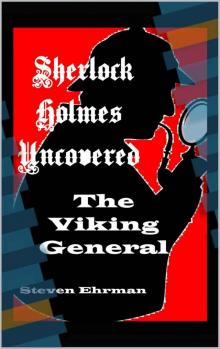 The Viking General (A Sherlock Holmes Uncovered Tale Book 9)
The Viking General (A Sherlock Holmes Uncovered Tale Book 9)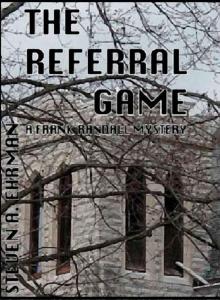 The Referral Game (A Frank Randall Mystery)
The Referral Game (A Frank Randall Mystery) Collection of Four Short Stories
Collection of Four Short Stories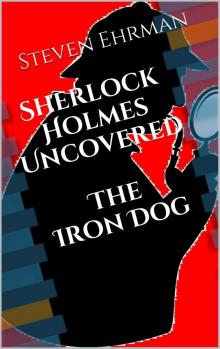 The Iron Dog (A Sherlock Holmes Uncovered Tale)
The Iron Dog (A Sherlock Holmes Uncovered Tale)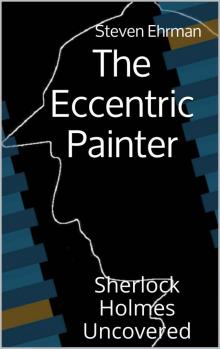 The Eccentric Painter (A Sherlock Holmes Uncovered Tale)
The Eccentric Painter (A Sherlock Holmes Uncovered Tale)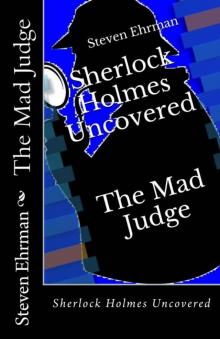 The Mad Judge (A Sherlock Holmes Uncovered Tale Book 3)
The Mad Judge (A Sherlock Holmes Uncovered Tale Book 3)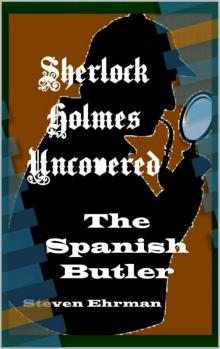 The Spanish Butler (A Sherlock Holmes Uncovered Tale Book 8)
The Spanish Butler (A Sherlock Holmes Uncovered Tale Book 8)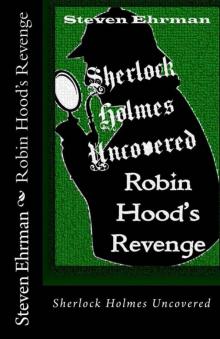 Robin Hood's Revenge (A Sherlock Holmes Uncovered Tale Book 7)
Robin Hood's Revenge (A Sherlock Holmes Uncovered Tale Book 7)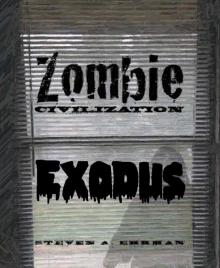 Zombie Civilization: Exodus (Zombie Civilization Saga Book 2)
Zombie Civilization: Exodus (Zombie Civilization Saga Book 2)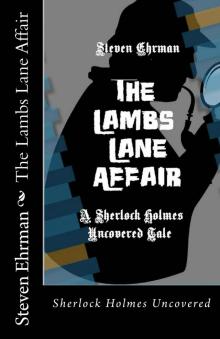 The Lambs Lane Affair (A Sherlock Holmes Uncovered Tale Book 5)
The Lambs Lane Affair (A Sherlock Holmes Uncovered Tale Book 5)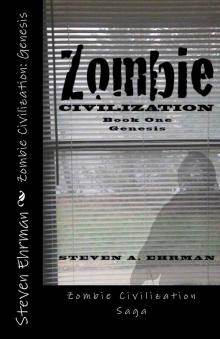 Zombie Civilization: Genesis (Zombie Civilization Saga)
Zombie Civilization: Genesis (Zombie Civilization Saga)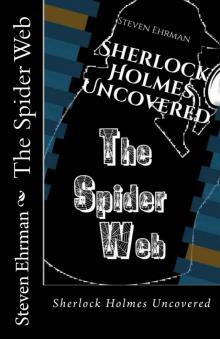 The Spider Web (A Sherlock Holmes Uncovered Tale Book 4)
The Spider Web (A Sherlock Holmes Uncovered Tale Book 4)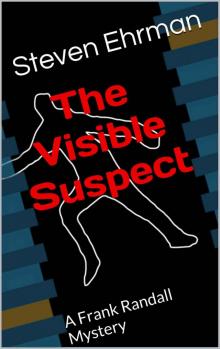 The Visible Suspect (A Frank Randall Mystery)
The Visible Suspect (A Frank Randall Mystery)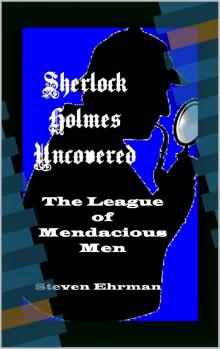 The League of Mendacious Men (A Sherlock Holmes Uncovered Tale Book 10)
The League of Mendacious Men (A Sherlock Holmes Uncovered Tale Book 10)